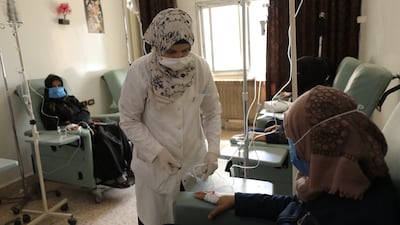A silent population of cancer patients living in conflict areas or displaced communities are going without treatment due to huge gaps in research and investment, experts have said at the World Cancer Congress in Geneva.
Wars in Gaza, Sudan and Ukraine have deprived thousands of refugee cancer sufferers of care, putting the lives of up to 10,000 people in danger.
Delays in treatment, diagnoses and access to healthcare centres due to the destruction wreaked by aerial bombardment have exposed the most vulnerable in society.
Aga Khan University Medical College, Nairobi, Kenya
As a result of the Russia-Ukraine war, there has been an increase of 3,600 cancer-related deaths since the conflict began, analysis by the Portsmouth Hospital University NHS Trust found.
Speaking on the opening day of the World Cancer Congress in Geneva, young people were most likely to feel the force of inadequate cancer care resulting from conflict.
“What we're seeing is a worsening climate crisis, geopolitical crises and conflict, debt and poverty affecting almost every country, including high-income countries which have been relatively spared until recently,” said Prof Richard Sullivan of King’s College London.
“In places like Nigeria, Brazil, South Africa and Kenya, these enormous demographic powers have really complex populations. A lot of what we do is about elite medicine for elite countries with elite patients, so there's an awful lot of the world’s population being left behind.”
Impact of war
The World Bank estimates about 1.2 billion people live in countries defined as fragile or in conflict.
The lasting impact of war across the Middle East, in Afghanistan, Iraq, Syria and Yemen, is still being felt across the region, with a rising incidence of cancer due to delayed diagnosis.
Limited access to data and research in these populations is also making it challenging to plug policy gaps, as well as to provide clear control and accountability of cancer care for the displaced, experts said.
“Cancer care should not be affected in any way by socioeconomic determinants, geography, or political dynamics, but unfortunately for refugees, this is their experience,” said Rana Ghafary, director of advocacy and government affairs at the King Hussein Cancer Foundation in Amman, Jordan.
“Often the focus is on relief ... cancer is overlooked for cost reasons, so we’re experiencing a huge set of challenges. Unequal access to care is a very big issue and fluctuating financing of cancer care is specifically an issue in low and middle-income countries with limited resources.
“We're experiencing critical aspects of care like screening, palliative care and psychosocial support, viewed as a luxury when it comes to refugees, but we're also struggling to cover life-saving treatment.”

High costs of cancer care, where the average round of chemotherapy can cost up to $8,000, is a critical barrier to provision of life-saving care. Refugees also struggle to access health facilities, technology and medication.
“In Gaza, we have 10,000 cancer patients with zero access to care because hospitals have been flattened to the ground,” Ms Ghafary said. “Access to healthcare providers and drugs is a privilege, while the living conditions for cancer patients in Gaza is going unspoken.
“Luckily, we have been able to evacuate over 100 patients from Gaza for treatment in Jordan. We need an open call for an immediate ceasefire in Gaza and to see policies to really stop the weaponising of health that is jeopardising cancer patient care.”
The King Hussein Foundation aims to bridge the treatment gap and has supported more than 5,000 cancer patients.
Quick response
The World Health Organisation was able to act quickly to extract some of the most vulnerable cancer patients from Gaza when the war escalated.
Lessons learnt from the Ukraine war, by monitoring the most vulnerable early on, enabled oncologists to track patients and continue their care in nearby Egypt and the UAE, where 1,000 patients were received in July.
A similar co-ordination between African nations, a continent with an estimated 40 million refugees, could have a similar impact in providing urgent cancer treatment, experts said.
“Africa has normalised conflicts and what we've seen unfortunately over the last a couple of years is health systems not working effectively, where patients will see six healthcare workers before a cancer diagnosis,” said Dr Miriam Mutebi, a consultant and breast surgical oncologist and assistant professor at Aga Khan University Medical College in Nairobi, Kenya.
“This is compounded by social, cultural barriers that already intrinsically decreases access. When you add on a layer of conflict, it pretty much goes up in smoke.”

An estimated 10.7 million people are now internally displaced in Sudan, according to the International Organisation for Migration.
Meanwhile, about 623,000 refugees are sheltering in Kenya, removed from conflict in Somalia and South Sudan.
“We have a lot of cancer care deserts in the Sahel area, so that has been the main focal point for improvement, as conflict has destroyed hospitals with cobalt machines that served millions of people,” said Dr Mutebi. “It really has to be a continental and a global initiative in thinking about this as a problem, irrespective of where you are in the world.”


